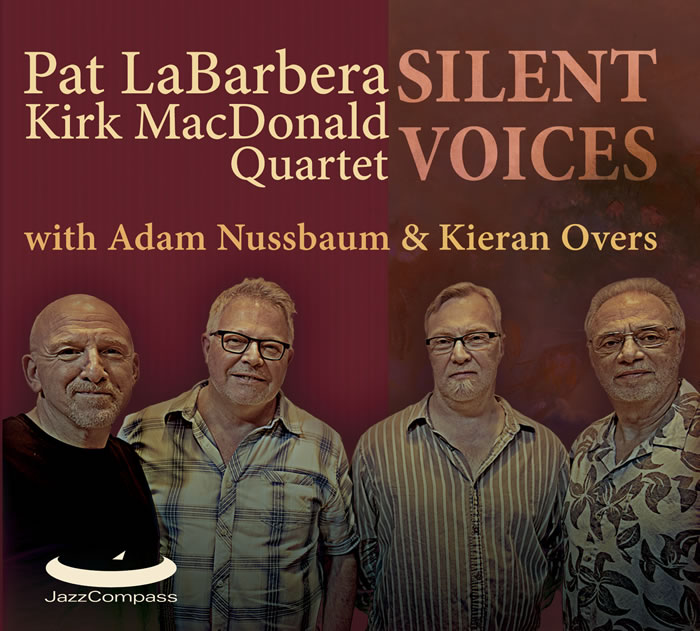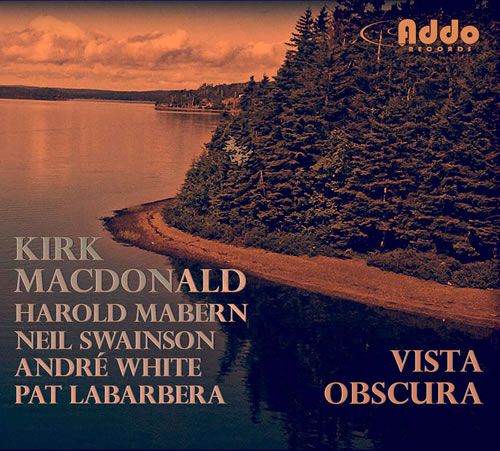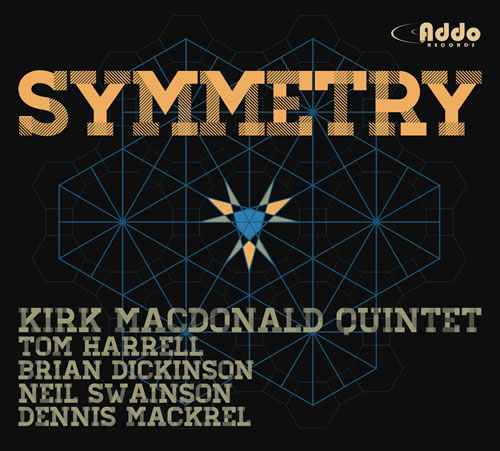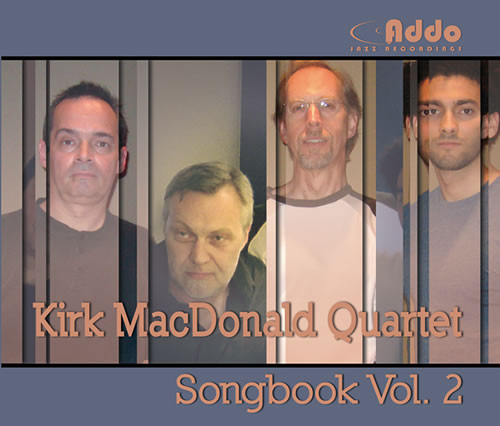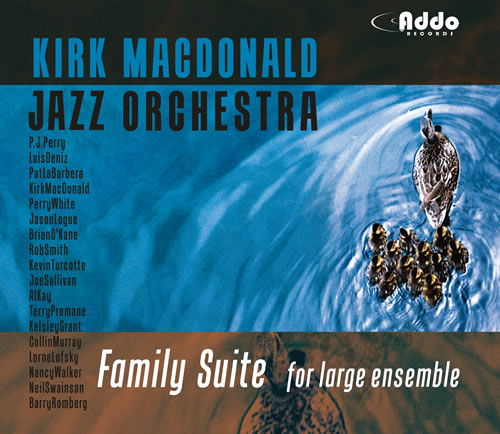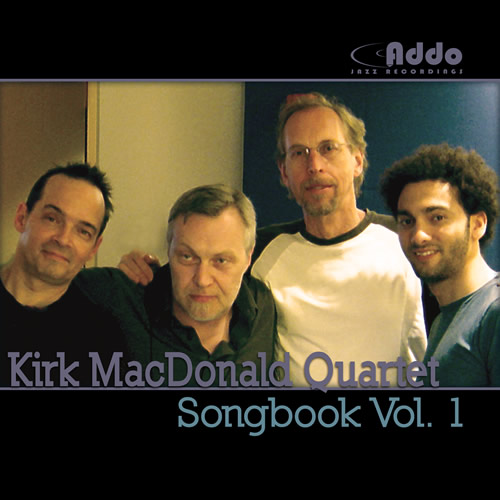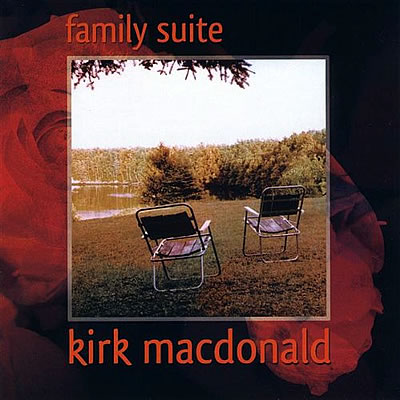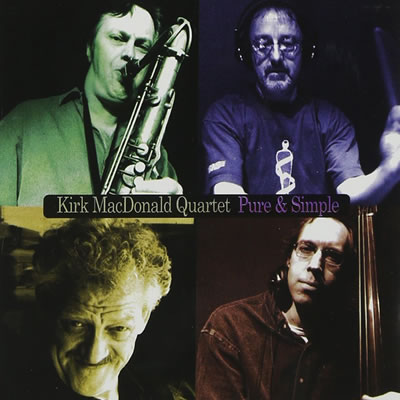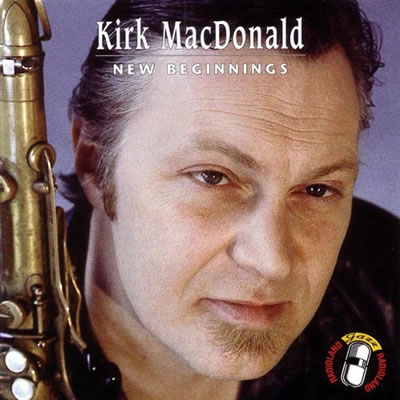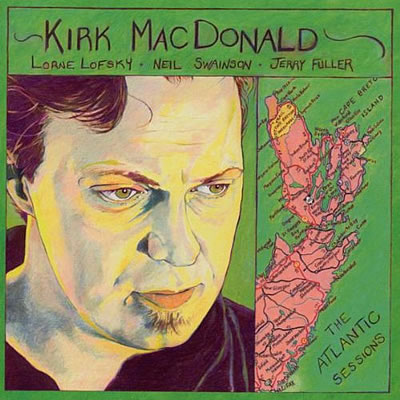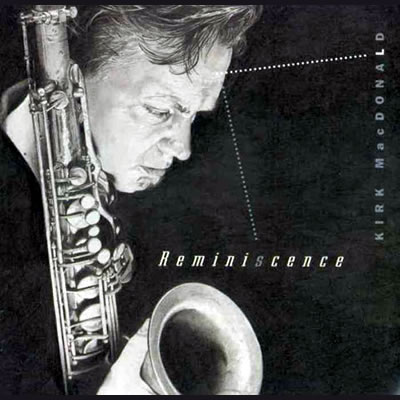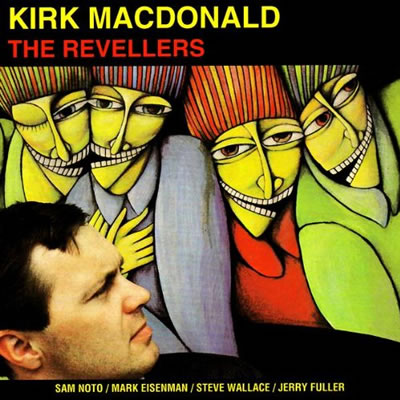“Kirk MacDonald has maintained his integrity as one of Canada’s leading saxophonists for over 25 years. As a composer and performer, Kirk has managed to turn out exceptional musical projects every few years that reflect his musical growth and direction.” – Pat LaBarbera – 2009 (liner notes from “Songbook Vol. I)
“Over the past decade, Toronto tenor saxophonist Kirk MacDonald has established a national identity. His throaty, fullbodied sound graces numerous recordings, and his performances across the country have made him a must see attraction. Coupled with superb compositional abilities, MacDonald’s complete musicianship gives him a creative edge.” – Greg Sutherland – THE JAZZ REPORT
“Finally MacDonald whose tone is the essence of tenor sax, packed to the gunwhales with harmonics and overtones, began to do that thing that he does – an endless stream of bop – like lines which he pours out, without repeating himself, as though he wasn’t simply playing licks, but tapping into a subterranean jet-stream of melodic invention.” – Steve Pederson – CHRONICLE HERALD
Pat LaBarbera/Kirk MacDonald Quartet: Silent Voices
by George W. Harris • August 7, 2017 • Jazz Weekly
“Pat LaBarbera and Kirk MacDonald mix and match their tenor and soprano saxes in an open sounding pianoless quartet with Kieran Overs/b and Adam Nussbaum/dr. Both reed players have strong tones on the tenor, and mix an ability to swing with a desire to stretch out into the post bop world. The tenors meld together deliciously on the moody “Days of Old” as well as going inside and out on “Walk The Talk.” The rhythm team uses space judiciously on pieces such as in the semi free “We Three” while the leaders foray back and forth like jai alai players on “22nd Street Waltz” and link together and slip away as members of a three legged race on “Manhattan Getaway.” The mix of soprano and tenor together works extremely well, creating a rich gumbo of harmonies on a few of the tracks. A hint of big band sax section and a hint of Coltrane. Intriguing.”
KMJO (Kirk MacDonald Jazz Orchestra): Common Ground
by Ted Quinlan • March 27, 2017 • The WholeNote
“Common Ground, the latest offering from saxophonist/composer Kirk MacDonald, is a major work of uncommon scope and depth. The double-CD set is also somewhat of a retrospective of material drawn from his impressive body of work, set this time in a big-band format by longtime collaborator, arranger and trumpeter Joe Sullivan. Sullivan, who has often worked with MacDonald in both large and small groups, displays an uncanny ability to interpret the composer’s tunes on a grand scale and the results here are outstanding. MacDonald has been generous in his allotment of solo space and the casting on this album is extraordinary, featuring a stellar lineup of Canada’s top jazz musicians.
PJ Perry and Pat LaBarbera are an inspired pairing on the title track. Perry’s beautiful alto tone and bop-ish sensibility sound perfectly at home in the contemporary harmonic context of MacDonald’s music. LaBarbera brings his huge tenor sound to a duet with bassist Neil Swainson for the opening of his solo. It’s a nice dynamic shift and the two master musicians take full advantage of the space it affords before the rest of the rhythm section kicks in and LaBarbera lets loose with impassioned, angular lines.
There are too many similarly brilliant moments to mention here. MacDonald’s rich tenor tone and deep linear concept can be heard several times throughout the album perhaps most notably on the final track Vanda Justina where he shares solo responsibilities with his daughter, the excellent clarinetist, Virginia Frigault-MacDonald.”
Kirk MacDonald: Vista Obscura
by Peter Hum • January 16, 2015 • The Ottawa Citizen
“Last year, Toronto tenor saxophonist Kirk MacDonald invited a special guest, New York-based trumpeter Tom Harrell, to pitch in on his superb album Symmetry. MacDonald, whose composing and arranging talents are often overlooked given the eloquence and energy of his improvising, crafted a perfect setting for Harrell, playing to his strengths with harmonically rich contemporary originals.
I offer this recap to help highlight MacDonald’s modus operandi with his late 2014 release Vista Obscura. This time out, the American guest star is jazz piano elder statesman, Harold Mabern, who at 78 has almost two and a half decades on MacDonald. Again, MacDonald has been the soul of hospitality, aligning the program to Mabern’s playing. The self-taught, Memphis-born legend is a blues-based player with a knack for driving, minor-key, modal playing, and Vista Obscura steers the music into Mabern’s wheelhouse.
So, the opener on MacDonald’s CD is a romp through John Coltrane’s Lonnie’s Lament, swung energetically, as Joe Lovano did on his Quartets: Live at the Village Vanguard album. In addition to MacDonald and Mabern, bassist Neil Swainson and Montreal drummer Andre White — a spot-on pairing although they live in different cities — provide crisp, centred propulsion.
Coltrane’s mid-period music is a guiding theme elsewhere on the disc too, most explicitly on an extended version of Naima and on MacDonald’s composition You See But You Don’t Hear, a charging straight-eighths tune that has Impressions at its foundation. On both tracks, MacDonald shares the limelight with another guest, his fellow post-Coltrane saxophonist Pat LaBarbera, who enlarges the band to a quintet and doubles the CD’s dose of muscular tenor playing.
LaBarbera also blows fiercely on The Mill Dam, a bossa-ish minor blues. In the same spirit is the quartet tune There But For The Grace Of…, Mabern’s stirring song for the homeless that finds great dignity in the sound of the blues.The disc’s other tracks are MacDonald compositions that stress lyrical melodies and more complex harmonic excursions. Calendula is a fetching waltz that MacDonald has recorded a few times — it’s a modern-day Canadian jazz standard if ever there was one. There’s a nice Swainson solo on this track, plus a bonus-like showcase for Mabern that seems to me to be crafted for him. Walkaround is medium-tempo, swaggering swinger. The title track and the closing track Mira Nights are slow bossas that offset the more robust playing elsewhere on the album.”
Kirk MacDonald: Symmetry (2014)
By JACK BOWERS, Published: January 12, 2014
(view original article at All About Jazz)
“Kirk MacDonald: Symmetry Following two splendid albums as leader of his own big band (Deep Shadows, Family Suite for Large Jazz Orchestra), Toronto-based saxophonist / educator Kirk MacDonald has returned to a small-group format for Symmetry, the thirteenth recording on which his name has been listed atop the marquee. In this case, however, any member of MacDonald’s quintet could have easily laid claim to the honor, as every one is an all-star in his own right, from the renowned trumpeter Tom Harrell, who shares the front line, to the exemplary rhythm section comprised of pianist Brian Dickinson, bassist Neil Swainson and drummer Dennis Mackrel.
Granted, assembling five world-class musicians in a studio to record doesn’t always pay dividends. Here, however, the idea seems truly inspired, thanks in part to their easygoing rapport and in even larger measure to MacDonald’s admirable compositions and arrangements, which bring out the best his colleagues have to offer. In the liner notes, MacDonald writes that he was searching for “beauty as a result of balance or harmonious arrangement.” Mission accomplished, starting with the shapely title selection and continuing through the nimble finale, “Bop Zone.” MacDonald later amplifies the remark, pointing out the genesis and form of each arrangement, but that is best left for musicologists to read and assimilate. Suffice to say that MacDonald has readily achieved his purpose.
“Bop Zone” is especially well-suited to MacDonald whose robust, darting tenor solos bring to mind such bop-era (and later) flame-throwers as Hank Mobley, Johnny Griffin, Teddy Edwards, George Coleman, Harold Land and Charlie Rouse, among others, not to mention such contemporaries as Lew Tabackin, Don Menza, Joe Lovano and Canada’s own Pat LaBarbera. As for Harrell, he is as always a model of tastefulness and consistency on trumpet or flugel, pouring years of invaluable discipline and experience into every persuasive solo. Dickinson and Swainson make the most of their moments in the sun (each is bright and perceptive whether out front or lending support), while Mackrel toils earnestly to help keep the rhythm sharp and steady. Even though no one is likely to end the day humming any of MacDonald’s themes, all are well-honed and consistently pleasing.
In sum, Symmetry more than lives up to its eurythmic name: a burnished and cohesive group endeavor whose whole is actually greater than its parts. Definitely worth checking out.”
Kirk MacDonald Quartet: Songbook Vol. 2
All About Jazz – BY JERRY D’SOUZA
Saxophonist Kirk MacDonald—an exemplary player, composer, bandleader and educator—has established himself as one of Canada’s premier jazz musicians. His compositions are geared to mainstream jazz, but he uses several tributaries to blood them and generates nuggets of energy and rumination.
MacDonald’s integrity as a player is defined by his versatility. He can forge ahead and find unexpected nooks of delight that tantalize, or he can go deep into the fabric of a ballad and spin a skein of warm melodic lines. Whatever the mood, the sentiment is palpable. Helping him achieve that plateau is the same band that elevated Songbook Vol. 1 (Addo Records, 2010) to a highly pleasurable listening experience.
“The Torchbearers” finds Macdonald pushing the envelope of bop. His turns of phrase and swift manifestation of ideas keep momentum in high gear with sturdy, yet pliant phrasing. Pianist David Virelles frames the concept, with a light touch that dances into the melody and then fills it with nuances. With drummer Barry Romberg giving the rhythm a crisp, crackling groove and showing just why he is a fount of supple energy, this tune turns out to be a signal cut on the record.
The haunting melody of “Vanda Justina” captures the imagination from the first note. After a heartfelt exposition of the melody, Macdonald turns on the heat and uncorks a sizzling dollop of runs, before he returns to infuse some tender sensitivity. Virelles, at first laidback and introspective, nourishes the progression with limpid flourishes and creates a niche of his own. And as always, the rhythm section is spot on, with bassist Neil Swainson, another jazz veteran, keeping the pulse locked in steady time.
A romping head turns somber on “New Beginnings,” when MacDonald comes in. That is only the beginning of a slew of ideas as he moves into a happier frame loosening a series of bends that fragment linearity. Virelles’s crystalline runs and subtle shifts of time and space add to this well-fathomed excursion. The quartet is in top form and this CD merits close listening.
Kirk MacDonald Jazz Orchestra: Family Suite for Large Ensemble
By Stewart Broomer, Published: October 31, 2012
“Toronto saxophonist Kirk MacDonald is doing a fine job of maintaining the modern big band tradition. His last recording Deep Shadows was a 2012 JUNO nominee and he’s followed it with another performance by his Jazz Orchestra, Family Suite for Large Ensemble (Addo AJR013). Here trombonist Terry Promane has taken on the challenge of arranging MacDonald’s 2008 quartet album Family Suite for an 18-piece band, emphasizing brass lustre with five trumpets and four trombones. Promane successfully adopts MacDonald’s complex original lines to the weightier textures, burnishing them with greater emotional depth, and MacDonald the soloist is clearly inspired anew. The quality of the writing is emphasized by the performances of an all-star band that includes alto saxophonist P.J. Perry, guitarist Lorne Lofsky and trumpeter Kevin Turcotte.”
Kirk MacDonald Quartet – SONGBOOK VOL. I
“The best thing about Kirk’s new CD other than the great playing is the fact that its called Volume 1. This would indicate that there are going to be further volumes which would be welcomed by this jazz fan! Pat Labarbera stages it perfectly in his liner notes; MacDonald needs to be heard on the world stage, I hope this CD will find its way to those who book festivals & tours & will give Canadian musicians of this stature a chance to perform and share their music in places other than their homeland. This quartet of musicians burns from the get go!” Cory Weeds – IN THE EARS
“MacDonald recently released a fine new quartet CD, Songbook Vol.1, on the new Toronto-based Addo label, which highlights his considerable skills as a composer. Of course, he’s been recognized as a robust, substantial player with a flair for long lines filled with harmonic implications for the longest time.
I think of Songbook Vol. 1 as containing two kinds of pieces. Three of the tunes are more jazzy than they are lyrical. One is Manhattan Getaway (which alternates harmonically tricky 7/4 and 4/4 sections in its form, not that MacDonald and his bandmates are perturbed). Moulage is a hearty composition with much to latch on to, which ultimately is So What when it’s solo time. On this track, pianist David Virelles uncorks a distinctive solo and when the tune vamps out, he and MacDonald happily bounce ideas off each other. Similarly, By Invitation Only is a winning composition that reveals its inspiration — the jazz standard Invitation — when the improvised solos begin. Before the tune concludes, there’s some creative thrashing from drummer Barry Romberg.
The four other tunes accentuate MacDonald’s lyrical side.The opener, New Piece, is an eminently singable song set to a bossa groove. Its extended coda, featuring MacDonald coursing through a new and appealing set of chords is a nice exercise in delayed gratification. Over its seven minutes, Calendula, transforms from a pretty waltz brought in by Virelles into a torrid joust for him and MacDonald. Fleeting features a surging groove and MacDonald playing both tenor and soprano saxophones. Goodbye Glenn, which closes the disc, is a swirling rubato tribute to the late Toronto saxophonist Glenn McDonald.
Throughout, Virelles, Romberg and bassist Neil Swainson support and interact with MacDonald with all the energy, sophistication and immediacy that he deserves — which is really saying something.” Peter Hum – OTTAWA CITIZEN
“Saxophone star Kirk MacDonald opens Addo’s account with Songbook Vol.1 (Addo Jazz Recordings AJR001) with seven of his own tunes and quality sidemen in pianist David Virelles, bass Neil Swainson and volatile drummer Barry Romberg. This adventurous music offers tuneful momentum, rhythmic flair and opportunities for bold contributions from bandsmen backing the leader’s warm, expressive and appealing sound Virelles and Romberg are never still while Swainson’s lush-toned bass anchors proceedings. The opening, expansive New Piece features flowing ideas, and you understand how Kirk has embraced composition as well as stellar performance. There’s winsome balladry on Calendula, passion lamenting late saxist Glenn McDonald, plus fiercely restless work on By Invitation Only (no prizes for knowing the inspiration).” WHOLENOTE MAGAZINE
FAMILY SUITE
“Known for his fiery tone and flair for burning tempi, Juno award winner Kirk MacDonald is one of Canada’s pre-eminent jazz saxophonists. Since the release of his first album nearly twenty years ago, MacDonald has gradually gravitated towards the strength of his own original compositions. Family Suite (Romhog Records 116), MacDonald’s sixth album as leader, is a personal affair. The poignant opening and closing theme, Dark Autumn, refers to the fall of 2002, an arduous time in which MacDonald lost his mother while still mourning the deaths of long-time collaborators Jerry Fuller and Joe Bendzsa. Each movement in the suite is meaningfully titled and dedicated. One of the liveliest, Four Shades of Light, features an electrifying tete-a-tete between the leader and Barry Romberg on drums, as well as Romberg trading fours with the exquisite Brian Dickinson on piano. Along with bassist Jim Vivian, the sensitive rhythm section is as good as it gets. Musically multifaceted as always, MacDonald delivers a highly rewarding, emotionally raw performance on this unquestionably cathartic recording.” WHOLENOTE MAGAZINE
“Family Suite is Kirk MacDonald’s sixth recording as a band leader, and sees him stepping out to front the multipart suite, which is a tribute to family members and close musical friends, past and present. The CD is comprised of an eight track modern jazz suite, in eleven parts, all composed by MacDonald, and featuring Brian Dickinson on piano, Jim Vivian on bass and the omnipresent Barry Romberg on drums.
Mr. MacDonald started to play saxophone at aged ten, and has went on to work with a sturdy list of leading jazz musicians including Claude Ranger, Dave Young, Sam Noto, Sonny Greenwich, Kenny Wheeler, Eddie Henderson, Harold Mabern, Walter Bishop Jr., Lorne Lofsky, Bob Mover, Pat LaBarbera, Phil Woods, John Taylor, and Ron McClure. All in all, he has played on over 25 jazz recordings as well as recording over 30 of his own compositions on CD.
The highlight is the ten minute The Prod / Sister Kim, Movements II and II which displays an astonishing sensitivity and musical empathy between the combo members. Elsewhere, Four Shades of Light – Movement V, absolutely sparkles, bouncing off a fabulous piano run from Brian Dickinson.
An engaging, invigorating and thoughtful album, this one comes highly recommended.” ZEITGEIST
Kirk MacDonald Quartet – PURE AND SIMPLE
“Whenever Kirk MacDonald heads up a session you can be sure you’re in for a treat. Pure and Simple is just that, four top flight musicians having a great blow in the true jazz tradition. The cohesion amongst these players is remarkable as they weave in and out of ideas propelling each tune to thoroughly reveal itself. MacDonald brings his unique and authoritative sound as well as four of his own compositions to this session. His lines are a constant flow of ideas probing the limits of an idea yet always thoroughly grounded. The rich tapestry of colour and texture always grabs your attention. Five By Five begins with an extended sax piano duet where MacDonald’s plaintive searching sound plays against John Taylor’s ever responsive piano. Taylor is one of those players whose skill at support is seamless only to burst forth with sparkle, clarity and a sureness that disarms. The structure and openness of his improvisation are beautifully conceived and executed.
Neil Swainson on bass has always brought lyricism and kindness to a session and that touch is evident here, where along with one of his own tunes, Scene In Passing, we get to sample his distinctive sense of warmth carried forward by the quartet. Along with the joyful and incisive textures of Terry Clarke’s drums, this group is really held together by an uncanny sense of inner momentum. Each of these finely skilled players is given opportunity to stretch yet they never stop beyond the intent of the session. MacDonald has managed to put together seven well-balanced tunes, displaying his compositional and arranging skills but most of all his selection of a group of players who exhibit a commonality and shared sympathy that turns music into magic.” Roger Martindill PLANET JAZZ MAGAZINE
“Tenor saxophonist Kirk MacDonald may have recorded his finest session yet. The music was conceived with all of the players in mind and that may explain the ease at which pianist John Taylor, bassist Neil Swainson and drummer Terry Clarke are able to transverse the often complex compositional territory. As always, MacDonald’s tone is clear and his solos are very focused. Another excellent outing.” THE JAZZ REPORT MAGAZINE
Kirk MacDonald – New Beginnings
“This is a CD that bears repeated listening with satisfaction attending every hearing. While the music is often dense and detailed, there is a justness in the proportions, a balance among the solos, and a seamlessness in the ensemble that only comes when first-rate players run full-out on intuition guided by superb aural perception.” Steve Pederson CHRONICLE HERALD
“From the first notes of the rugged On The Sierra Nevada the session is hard-bop heaven…All the soloists animate the charts, turning up the improv heat as guitarist Lorne Lofsky, bassist Neil Swainson and drummer Jerry Fuller generate the glowing warmth of an open fire.” Geoff Chapman THE TORONTO STAR
Kirk MacDonald – The Atlantic Sessions
“A powerful session recorded in Halifax by the Toronto based tenor is his best yet…MacDonald’s third outing as a leader pinpoints his fervour and fire, insistent search for new sounds and hard yet opulent tone.” Geoff Chapman – THE TORONTO STAR
“…this is a strong, hard bop date that finds Kirk MacDonald (a player who deserves to be much better known) in prime form.” Scott Yanow – THE JAZZ REPORT
Kirk MacDonald – Reminiscence
“MacDonald sounds stronger and more beautiful than ever. His impressive musicality in both his playing and writing continues to inspire.” Campbell Ryga – THE JAZZ REPORT
“Satisfying post-bop effort, again stylish and substantial.” Mark Miller – THE GLOBE AND MAIL
Kirk MacDonald – The Revellers
“Tenor saxophonist Kirk MacDonald plays to the deep strengths of his instrument on The Revellers regarding tradition without becoming tradition’s slave.” Randall McIllroy – WINNIPEG FREE PRESS
“It’s a measure of MacDonald’s inventiveness that he manages to find new things to say with warhorses like Embraceable You and Body and Soul.” Paul Wells – MONTREAL GAZETTE

